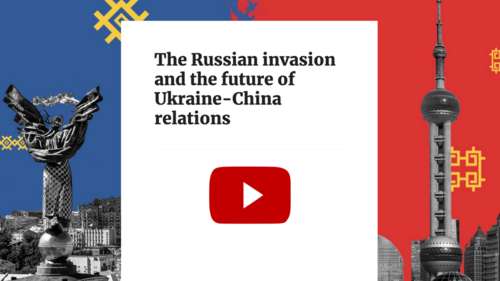Deciphering China's Ukraine Calculus
Deciphering China's Ukraine Calculus
China’s rhetoric and actions toward Ukraine are shaped by domestic politics and prior decisions about protecting its national interests and finding opportunities in the crisis, says Shorenstein APARC Fellow Thomas Fingar.

In his opening keynote at the 2022 BRICS Summit, a meeting of the world's leading emerging market economies, Chinese leader Xi Jinping said the conflict in Ukraine has "sounded an alarm for humanity." Yet at the same time, Mr. Xi condemned U.S.-led sanctions against Russia, reinforcing China’s declared position of neutrality while backing Russia. With this contradictory stance, Beijing seeks to preserve the appearance and the presumed political benefits of its putative special relationship with Russia because it deems it advantageous to countering real and imagined threats from the United States, explains Shorenstein APARC Fellow Thomas Fingar.
China’s rhetoric and actions toward Ukraine derive from its calculus on how its ties to Moscow help it manage the United States, said Fingar on a panel that examined the Russian invasion of Ukraine and the future of Ukraine-China relations. Held virtually on June 23, the panel discussion was co-organized by Ukraine’s National Institute for Strategic Studies, the A. Krymskyi Institute of Oriental Studies at the National Academy of Sciences of Ukraine, and the Ukrainian Association of Sinologists.

Sign up for APARC newsletters to receive our experts' commentary and analysis.
Fingar presented an American perspective on China’s actions and calculations with respect to Ukraine, Russia, and the United States. He emphasized that Beijing’s response to Putin’s invasion is shaped primarily by prior decisions about pursuing China’s national security, developmental, and political objectives. “When formulating policies toward Ukraine and other countries, Beijing begins by asking two questions: What can the country do to China, and what can it do for China,” he said. Considerations of ideology, history, or personal relationships are all secondary.
Reflecting on the future relations between China and Ukraine, Fingar noted that Beijing hopes its declared neutrality in the Russia-Ukraine war and modest humanitarian aid to Ukraine will forestall punitive actions by Kyiv for China’s rhetorical support of Russia and that its economic strength and demonstrated ability to build infrastructure will give it a significant role in post-war reconstruction.
The panel also considered questions such as how China’s goals concerning Taiwan affect its position regarding Ukraine, what China may gain and lose strategically from the Ukraine conflict, and the role U.S.-China relations.
Watch the complete discussion via the Ukrainian Association of Sinologists’ YouTube channel.




